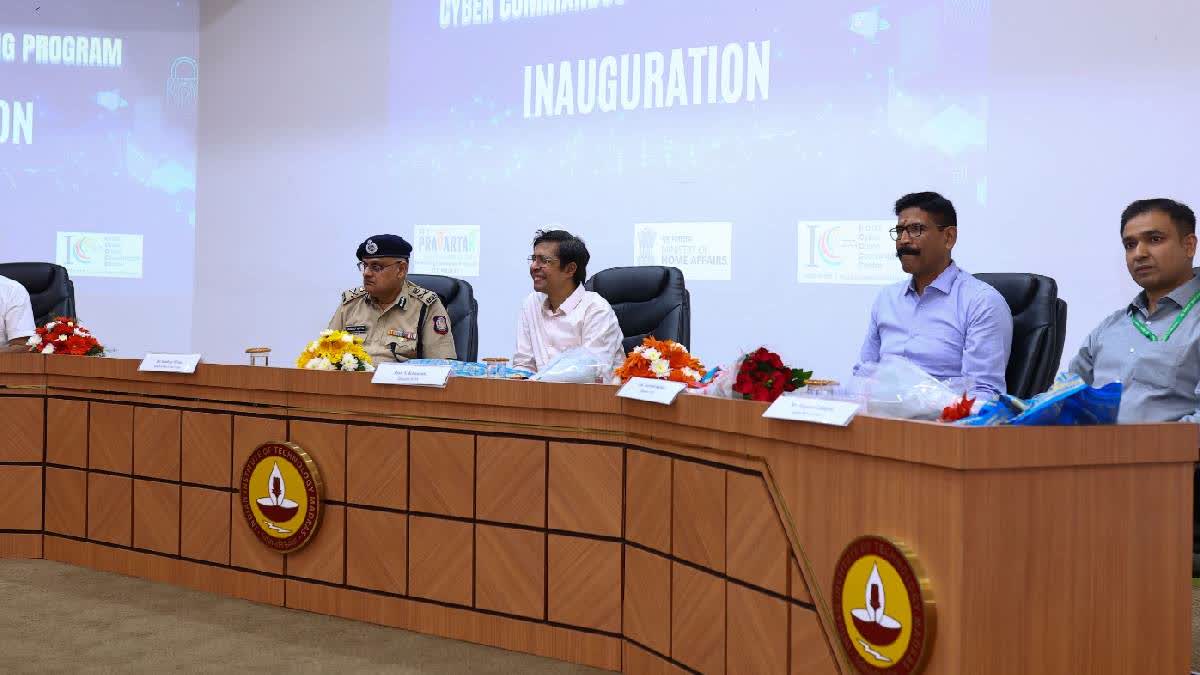Chennai: The IIT Madras Pravartak Technologies Foundation has launched a new training programme to create ‘Cyber Commandos’ among law enforcement officers across India. An initiative of the Union Ministry of Home Affairs (MHA), the ‘Cyber Commandos’ programme is a critical step in bolstering India’s cyber defence capabilities.
This specialised force will be at the forefront of defending the nation against cyberattacks, safeguarding sensitive data and maintaining digital sovereignty.
The Cyber Commandos will represent a significant upgrade from existing cybercrime cells. While these cells primarily focus on reactive measures like investigation and prosecution of cybercrimes, the commandos will be a proactive force.
The training programme was launched at IIT Madras on Thursday by Prof V Kamakoti, Director, IIT Madras, in the presence of Dr. Sandeep Mittal, IPS, Additional Director General of Police (ADGP), Cyber Crime Wing, Tamil Nadu, Col. Arvind Kumar, Director, Indian Cyber Crime Coordination Centre (I4C), Mayank Ghildiyal, Deputy Director, I4C, Dr MJ Shankar Raman, CEO, IIT Madras Pravartak Technologies Foundation and other dignitaries.
The urgency of this initiative has been emphasised by the increasing frequency and severity of cyber threats India faces. From financial fraud and data breaches to critical infrastructure attacks, the digital landscape poses significant risks. The Cyber Commandos programme is essential to ensure India is adequately prepared to counter these threats and protect its citizens and economy in the digital age.
The trainees will comprise officers from the law enforcement ecosystem who will be trained as cyber commandos. The course will entail advanced modules on systems forensics, detection and prevention of unethical access to systems, detecting crimes in the cyber domain, among others.
Addressing the inaugural programme, Prof V Kamakoti, Director, IIT Madras, said, “On a daily basis, the cyber threat landscape is increasing. We are getting more and more devices into our day-to-day life as digitisation increases. Data is very important now. Processing of both structured and non-structured day is also vital.”
Prof. Kamakoti added, “We need to arrive at a proactive way to prevent cyber threats. We need to have a deep understanding. The next six months will deal with how to proactively detect cyber attacks and use forensic technologies to develop defenses. This effect is going to be very important and I thank MHA for supporting this program.”
Recognising the escalating sophistication of cyber threats, this programme aims to equip law enforcement officers with advanced skills to combat cyber challenges effectively. Through rigorous training, State and Central police personnel will be transformed into cyber experts, capable of investigating complex digital crimes, tracking cybercriminals, and protecting critical infrastructure.
Equipped with advanced skills and technology, they will be at the forefront of preventing cyberattacks, along with responding to them.
Speaking on 'Future Cyber Challenges in Indian Context', Dr Sandeep Mittal, IPS, Additional Director General of Police (ADGP), Cyber Crime Wing, Tamil Nadu, said, “The cyber domain is extremely attractive for malicious actors because it is highly dynamic, faceless and boundary-less domain capable of throwing surprises with rapidity. It is a very low-cost effort with asymmetric results. The risks are the opportunities and the opportunities are the risks. The discovery of Stuxnet in 2010 heralded into an era of a weaponisation of software code. This was only the beginning as it was followed by many things.”
Dr. Sandeep Mittal added, “By 2024, there will be 50 billion Internet connected devices, such as refrigertors, microwaves, washing machines and so on. Critical infrastructure, especially operational systems, needs to be well-protected. Cyber security needs an understanding of international conventions on cybercrimes as the cyber criminals are mostly abroad.”
Further, Col. Arvind Kumar, Director, Indian Cybercrime Coordination Centre (I4C), said, “This six-month course will have 70 percent as practicals with only 30 percent being theory component in this program. Industry visits have also been planned. IIT Madras faculty will be handling this programme and training you (Cyber Commandos)."
The Indian Cybercrime Coordination Centre (I4C) was established by MHA to provide a framework and eco-system for Law Enforcement Agencies (LEAs) for dealing with Cybercrime in a coordinated and comprehensive manner.
Highlighting the importance of this initiative, Dr. MJ Shankar Raman, CEO, IITM Pravartak Technologies Foundation, “Today, we are fighting a war that does not have boundaries. Here, we do not know where the ‘bomb’ will fall. Using software, one can take out physical infrastructure. Even though we have identified critical National infrastructure, we are following the Western thinking. However now, the Indian Government is focused on doing things differently and has supported this Cyber Commandos Program.”
“We need lateral thinking to identify loopholes in technology so that they can be addressed. The idea is to upgrade your skills and your investigation follows advanced techniques to submit proof that will stand up in Court,” Dr. MJ Shankar Raman added.
IITM Pravartak Technologies Foundation is a Section 8 Company housing a Technology Innovation Hub on Sensors, Networking, Actuators and Control Systems. It is funded by the Department of Science and Technology, Government of India, under its National Mission on Interdisciplinary Cyber-Physical Systems and hosted by IIT Madras.
Read more



